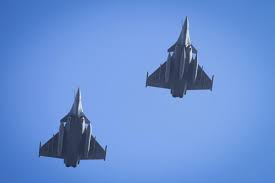China used embassies to undermine sales of France’s flagship Rafale fighter jet: report

A recent French intelligence report has revealed that China used its embassies to sabotage sales of France’s Rafale fighter jet. The move targeted Dassault Aviation’s flagship aircraft at a time when global defense competition continues to intensify.
The report, first shared by the Associated Press, claims that Chinese diplomats and military attaches worked behind the scenes to influence defense officials in several countries. Their goal was to discredit the Rafale’s performance and promote Chinese-made fighter jets instead.
China’s Growing Influence in Defense Deals
According to French officials, China’s efforts grew stronger after the India–Pakistan border clash in May. During the conflict, India deployed Rafale jets, while Pakistan claimed it shot down three of them. Although this claim lacked independent verification, it spread widely online and opened the door for disinformation.
Chinese diplomats allegedly approached defense officials in countries like Indonesia, suggesting the Rafale underperformed and cost too much. These unsolicited discussions included comparisons between the Rafale and Chinese models like the J-10C and J-20.
Rafale’s Image Under Attack
French intelligence traced a coordinated digital campaign that circulated false claims about the Rafale’s reliability. This campaign included fake social media accounts, manipulated images, and AI-generated videos. Many of these accounts posted in English, French, and local languages to reach broader audiences.
Some profiles posed as aviation experts or journalists. They shared fake crash reports, altered footage, and misleading headlines. These accounts also tagged defense ministries to amplify the content.
A senior French defense official noted, “This campaign wasn’t just about business. It was about shaping perception and weakening trust in our technology.”
France Responds Through Diplomacy
In response, France began a diplomatic outreach to explain the Rafale’s actual performance record. French embassies provided detailed briefings and materials to counter the misleading information. They also emphasized Dassault’s proven record in combat zones like Libya and Mali.
Meanwhile, China denied all accusations. A defense ministry spokesperson called the report “baseless slander” and claimed that China respects arms trade protocols.
Despite this denial, French officials believe the effort was part of a broader plan to challenge Western military presence in key regions like the Indo-Pacific.
Disinformation Meets Diplomacy
What makes this case significant is the blending of diplomatic efforts with digital warfare. China used its state apparatus to project influence not just through speeches or trade deals, but through psychological operations and online manipulation.
Analysts say this tactic reflects a shift in how countries compete for defense contracts. It’s no longer just about performance specs or price. Countries now try to shape global opinion and plant doubt about rival technologies.
“This is modern warfare without missiles,” said a European security analyst. “It’s silent, persistent, and hard to trace.”
Rafale’s Role in Global Security
The Rafale jet has emerged as a top choice for several countries. India, Egypt, Qatar, Greece, and Indonesia have all signed deals to purchase it. France continues to pitch the Rafale as a versatile, combat-tested option for modern air forces.
The aircraft supports both air-to-air combat and deep-strike missions. It comes equipped with cutting-edge radar, missile systems, and stealth capabilities. For countries wary of relying on U.S. or Russian equipment, the Rafale offers a strong alternative backed by French strategic autonomy.
But with increased visibility comes increased competition. China, now a major defense exporter, wants to capture that market. Its J-10C and J-20 fighters are often pitched as affordable alternatives. To support those exports, China appears to have used both state media and embassy networks.
Wider Implications for Defense Deals
This isn’t the first time disinformation has entered defense negotiations, but the scale and coordination here raise new concerns. Buyers now face a new challenge—separating truth from propaganda in high-stakes deals.
French officials argue that such tactics could destabilize transparent military partnerships. If countries make decisions based on false narratives, global security cooperation could suffer.
This episode has already prompted discussions in Europe about strengthening information resilience and investing in digital countermeasures. It also shows the need for buyers to independently verify military performance claims.
Conclusion
The French report reveals a growing reality: military power is now wielded not just with weapons, but with words, data, and digital manipulation. As the arms race moves into cyberspace and diplomacy, countries must remain alert to influence campaigns that aim to mislead, disrupt, and divide.
China’s alleged actions highlight the need for transparency in global defense trade. More importantly, they remind us that narrative control has become just as crucial as air superiority.






